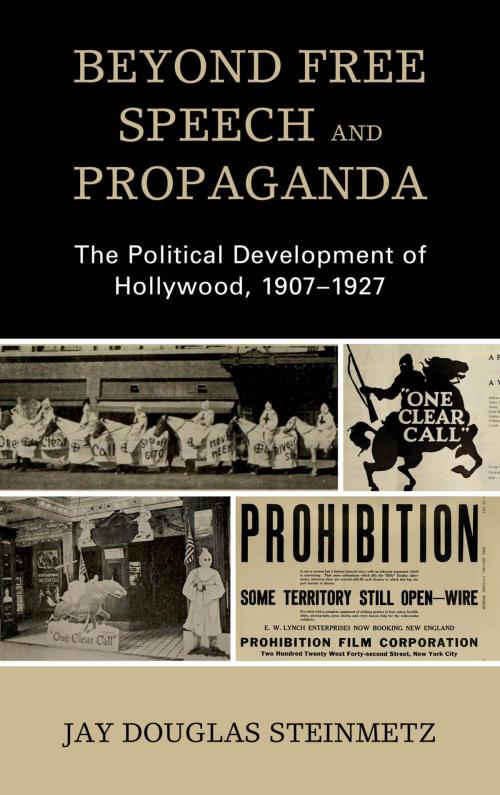Beyond Free Speech and Propaganda
The Political Development of Hollywood, 1907–1927
Nonfiction, Reference & Language, Language Arts, Communication, Entertainment, Film, History & Criticism, Social & Cultural Studies, Political Science, Politics, History & Theory| Author: | Jay Douglas Steinmetz | ISBN: | 9781498556811 |
| Publisher: | Lexington Books | Publication: | November 24, 2017 |
| Imprint: | Lexington Books | Language: | English |
| Author: | Jay Douglas Steinmetz |
| ISBN: | 9781498556811 |
| Publisher: | Lexington Books |
| Publication: | November 24, 2017 |
| Imprint: | Lexington Books |
| Language: | English |
In Beyond Free Speech and Propaganda: The Political Development of Hollywood, 1907–1927, Jay Douglas Steinmetz provides an original and detailed account of the political developments that shaped the American Film Industry in the silent years. In the 1900s and 1910s, the American film industry often embraced the arguments of film free speech and extolled the virtues of propagandistic cinema—the visual art of persuasion seen as part and parcel of deliberative democracy. The development of American cinema in these years was formatively shaped by conflicts with another industry of cultural consumption: liquor. Exhibitors battled with their competitors, the ubiquitous saloon, while film producers often attacked the immorality of drink with explosive propaganda on the screen.
But the threat of censorship and economic regulation necessitated control and mastery over the social power of the cinema (its capacity to influence the public through the visualization of ideas) not an open medium of expression or an explicitly political instrument of molding public opinion. By the early 1920s, big producer-distributors based in Southern California sidelined arguments for film free speech and tamped down the propagandistic possibilities of the screen. Through their trade association, the Motion Picture Producers and Distributors of America, headed by Republican insider Will H. Hays, the emerging moguls of Hollywood negotiated government regulation, prohibition, and the insurgency of the Ku Klux Klan in the turbulent 1920s.
A complex and interconnected work of political history, this volume also uncovers key aspects in the development of modern free speech, propaganda in American political culture, the modern Republican Party, cultural developments leading up to prohibition, and the rise and fall of the Ku Klux Klan in the 1920s. This work will be of particular interest to film and political historians interested in social movements, economic development, regulation, and the evolution of consumer capitalism in the early 20th century.
In Beyond Free Speech and Propaganda: The Political Development of Hollywood, 1907–1927, Jay Douglas Steinmetz provides an original and detailed account of the political developments that shaped the American Film Industry in the silent years. In the 1900s and 1910s, the American film industry often embraced the arguments of film free speech and extolled the virtues of propagandistic cinema—the visual art of persuasion seen as part and parcel of deliberative democracy. The development of American cinema in these years was formatively shaped by conflicts with another industry of cultural consumption: liquor. Exhibitors battled with their competitors, the ubiquitous saloon, while film producers often attacked the immorality of drink with explosive propaganda on the screen.
But the threat of censorship and economic regulation necessitated control and mastery over the social power of the cinema (its capacity to influence the public through the visualization of ideas) not an open medium of expression or an explicitly political instrument of molding public opinion. By the early 1920s, big producer-distributors based in Southern California sidelined arguments for film free speech and tamped down the propagandistic possibilities of the screen. Through their trade association, the Motion Picture Producers and Distributors of America, headed by Republican insider Will H. Hays, the emerging moguls of Hollywood negotiated government regulation, prohibition, and the insurgency of the Ku Klux Klan in the turbulent 1920s.
A complex and interconnected work of political history, this volume also uncovers key aspects in the development of modern free speech, propaganda in American political culture, the modern Republican Party, cultural developments leading up to prohibition, and the rise and fall of the Ku Klux Klan in the 1920s. This work will be of particular interest to film and political historians interested in social movements, economic development, regulation, and the evolution of consumer capitalism in the early 20th century.















